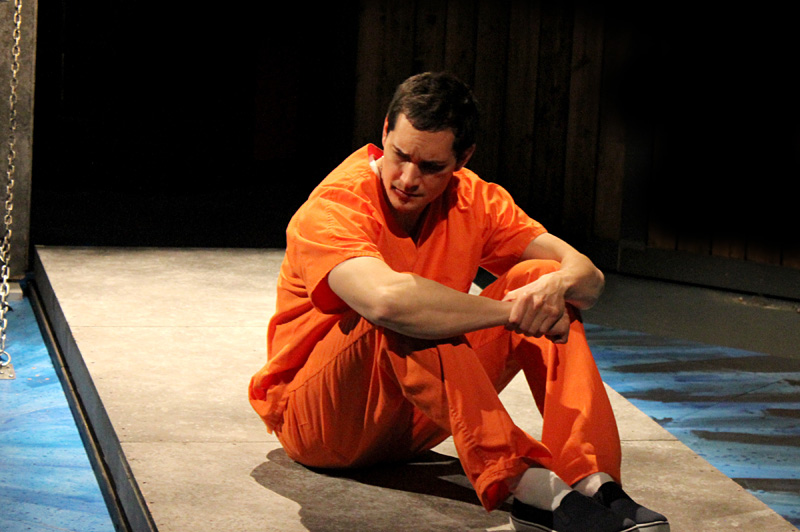In staging Stephen Adly Guirgis’ 2000 prison drama, Azeotrope has knocked this production out of the park, swinging at rich and thorny material with explosive honesty and superb acting. Hours later, I’m still trembling, stomach clenched, mind scrambling to sort out the Möbius-like succession of ideas. Unlike such musty “God plays” as C.S. Lewis’ Freud’s Last Session (revived at Taproot this spring), which dutifully chaperone us through drawing-room theology, Jesus Hopped concerns dangerous and imperiled everymen. The story is set in the Rikers Island cellblock of born-again serial killer Lucius (played by a charisma grenade with one name: Dumi) and lapsed Catholic Angel Cruz (Richard Nguyen Sloniker).
Awaiting extradition to Florida (which has the death penalty), Lucius spends his time in the sunny prison yard praising God and working out. (Unless he’s being abused by the sadistic “I worship the Devil” guard played by Ray Tagavilla.) New boy Angel, in for shooting a cult leader who “stole” his best friend, accepts Lu’s kindness but not his proselytizing. Their debate, plush and profane, bridges the concrete slabs of Deanna Zibello’s versatile set. Meanwhile, Angel’s lawyer Mary Jane (Angela DiMarco, in a rare serious role) preps him for trial despite an intriguing technicality that eventually catches up with them. The tale brims with backstory, twists, and provocative questions. Some are resolved by character monologues that break the proscenium—usually a pet peeve of mine, but they feel like genuine conversations in the intimate Eulalie Scandiuzzi Space. As Angel’s case develops, director Desdemona Chiang gracefully avoids the formula of TV crime procedurals. We feel the urgency of a friend’s judicial ordeal.
“Legal justice,” says the lawyer, “is an oxymoron.” Well, maybe it’s more of a subjective notion for Guirgis (whose The Motherfucker With the Hat was a hit last year in New York). His play asks us to consider how the right thing may not be the legal thing. And how the legal thing may be right but abhorrent. Also located at the core of this fascinating play is the concept of jury nullification, which can provide a kind of salvation-on-Earth for the accused and give each juror the power and responsibility of a god.








